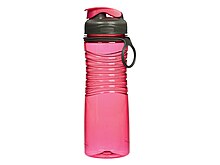Tritan, a copolymer offered by the Eastman Chemical Company since 2007, is a transparent plastic intended to replace polycarbonate, because of health concerns about Bisphenol A (BPA). Tritan is a copolymer made from three monomers: dimethyl terephthalate (DMT), cyclohexanedimethanol (CHDM), and 2,2,4,4-tetramethyl-1,3-cyclobutanediol (CBDO). Tritan (PCTG) is made without using any BPA.

Eastman Tritan cannot be used for hot beverages (like hot water, coffee or tea) and is recommended only for usage temperatures below 60 °C, as it starts to deteriorate at temperatures above 80 °C.
In April 2008, Nalgene announced it would phase out production of its outdoor line of polycarbonate containers containing the chemical bisphenol A. Nalgene now uses Tritan as a replacement for polycarbonate, as it does not contain BPA.
Health controversy
In 2011, a neurobiologist at the University of Texas, George Bittner, published an article claiming most polymers, including Tritan, contained other materials with estrogenic activity.
Eastman Chemical Company sued, and after a jury ruled in Eastman's favor, the Court barred Bittner from making claims about Tritan's oestrogenic activity.
Similar products
Other manufacturers have developed similar products including the French ARC International's Kwarx since 2006, the German Glaskoch (Leonardo) Teqton since 2009 and the South-Korean SK Chemicals' Ecozen, a glycol-modified polyethylene terephthalate (PETG) since 2010/2011. Other manufacturers propose polypropylene (PP) or methylstyrene (MS) as alternatives to Tritan.
Name confusion
Tritan can also refer to a type of so called unbreakable glass originally developed by the German Schott Zwiesel AG in 2002 together with University of Erlangen–Nuremberg. Its name is derived from titanoxide (titanium oxide in English). In 2012, the Zwiesel Kristallglas AG introduced Tritan Protect. Confusingly, although both are unrelated, Zwiesel Tritan glass and Eastman Tritan copolyester are both advertised as "shatter protected" and are used in the production of drinking glasses as replacements for traditional glasses, despite their different material properties.
See also
- Superfest (a chemically hardened glass also known as Ceverit and CV-Glas)
- Gorilla Glass
- Borosilicate glass (a heat-resistant glass)
References